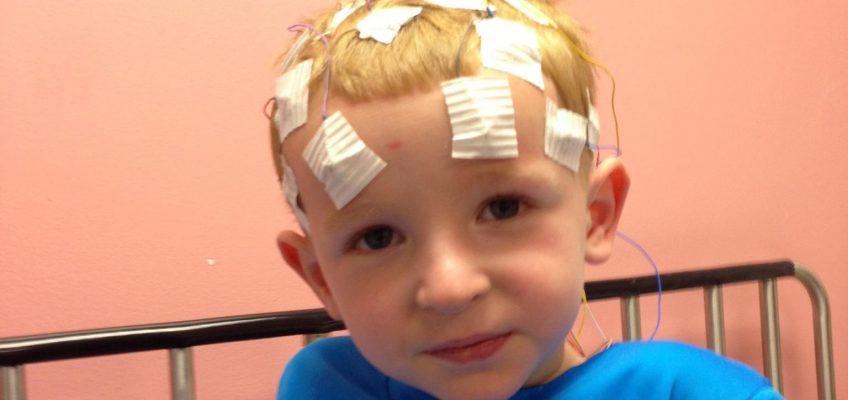
Recently I have had a lot of questions on my Facebook page about how parents can help their young children with epilepsy and how to keep them calm during an EEG. Parents are often unfamiliar with the test and don’t know how to plan or prepare their child.
What is an EEG?
An EEG detects abnormalities in the brain waves or electrical activity of the brain. The brain produces electricity, which can be measured by wires glued onto the scalp. The EEG records and charts these electrical voltages. The normal up-and-down movements of the voltages create the wave-like patterns. Spikes on the EEG are markers of hyper-excitable parts of the brain, which mark potential locations where seizures may arise. The presence of spikes help when a doctor is in the process of diagnosing epilepsy.
Why Should My Child Have an EEG?
EEGs can give you valuable information about your child’s brain. It is possible that your child is having seizures or abnormal brain waves that are disrupting their development, but you can’t even see them. Not all seizures are visible. EEGs can also help provide information about sleep disorders or brain inflammation, but generally they are used as a diagnostic tool to determine what types of seizures your child may be having so they can be better treated.
How Do We Prepare for an EEG?
When I first went for my EEG I was so anxious, I was only 10/11 and I didn’t understand anything about Epilepsy, all I knew was that something seemed wrong, both me and my Family were on edge, not knowing what was going to happen. Usually there isn’t much that you have to do before an EEG. Generally you’ll be told to eat the same diet, take the same medications and sleep the same hours before your test, but sometimes your doctor may give you some special instructions, for me I got told to take my medication at a certain time, and to eat an hour before the scan.
Sometimes doctors want to see how your child’s brain reacts when they are tired or sleeping so they may ask that your child be “sleep deprived” for the test. Some parents worry about this, they wonder how to keep their child awake or what not to do. This test is similar to a regular EEG, except that you will be asked to stay awake for 24 hours prior to your exam time. Children under the age of 12 who take this test are asked to remain awake from midnight until exam time. They tell you to not eat or drink anything containing caffeine between midnight and the time of your test. A sleep-deprived EEG takes about one-and-a-half to two hours. They may want your child to fall asleep during the test so they can record sleeping brain waves.
Another bit of advice is to wash your hair the night before and not use any conditioners or products in their hair so the glue sticks better; so no hairspray or gel.
Does an EEG hurt?
No, You’ll feel little or no discomfort during an EEG. The electrodes don’t transmit any sensations. They just record your brain waves.
Who is suited for an EEG?
Anyone; An EEG is one of the main diagnostic tests for epilepsy. An EEG may also play a role in diagnosing other brain disorders, no matter the age or gender.
More information
For more information visit our page on epilepsy diagnostics.










Leave a Reply